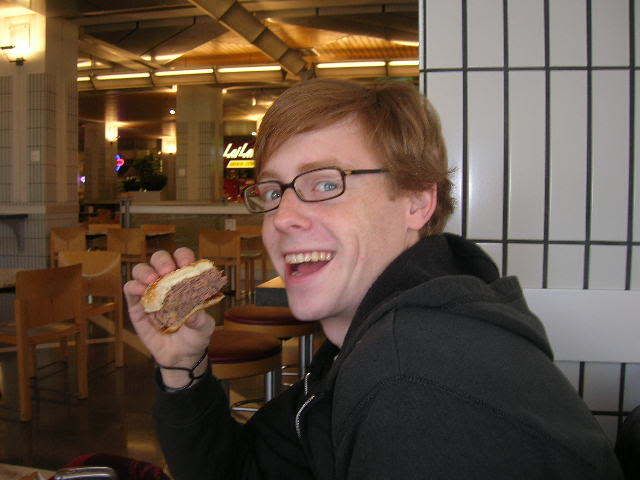 FILM
FILM In Which We Are All Rewriting Our Reality
 Tuesday, June 30, 2009 at 11:40AM
Tuesday, June 30, 2009 at 11:40AM 
Face to Face
by TYLER COATES
I was recently dating someone who, when I mentioned that I was writing a piece on Annie Hall for this website, told me that I should say that it is a good "training film" for Woody Allen's catalogue. His theory was that it combines the sight gags and irreverent humor of his earlier works (Bananas, Sleeper), and gives an introduction to those quiet, heavy, philosophical pieces from the late '70s and '80s.

I told him that I disagreed; sure, it's got a little bit of everything, and it definitely represents a shift in Allen's oeuvre that would lead to somber comedies like Stardust Memories, Manhattan, and Hannah and Her Sisters. My thesis, however, was that Annie Hall is the perfect Woody Allen film; it seems to be the most authentically autobiographical (as every Woody Allen protagonist — whether he or she is played by Allen or by Kenneth Branagh, Will Ferrell, or Scarlett Johansson — is essentially Woody Allen), and it's one of the few truly successful post-modern films that is able to take bits and pieces from every single method of filmmaking and mash it all together into one movie which runs just over an hour and a half!
A few days after we talked about Annie Hall, we found ourselves sitting next to each other in silence on the train heading home from a party.
I turned to him and asked, "What are you thinking?"
He replied, "What you you thinking?"
"No, I asked you first."
"I don't care, you tell me first."
Eventually, we admitted, mutually, that we were thinking the same thing: we liked each other, and we enjoyed spending time together, but it wasn't going anywhere. I couldn't help but think of the scene in which Alvy and Annie are sitting on flight from California and they realize, in near unison, exactly where they are heading. "A relationship, I think, is like a shark," Alvy says. "It has to constantly move forward or it dies. And I think what we got on our hands is a dead shark."
And, really, has anybody's life ever seemed like a scene from Stardust Memories, or Manhattan, or Hannah and Her Sisters? Not mine, that's for certain.

The beauty of Annie Hall is its nonlinear plot structure. Instead of focusing the film on the story — which, at its base, it just the chronicle of a couple meeting, having some good times, and then, eventually, some terrible times — Allen chops up the story.
He jumps from Alvy's childhood (he grew up under the roller coaster on Coney Island) to a date between Alvy and Annie, in which they loudly quarrel about their sexual schedule. It isn't until a few more scenes that we learn how Alvy and Annie met. The device allows us to discover the couple's personalities; the story of their relationship isn't as important as what's going on inside their heads (and we have access to their thoughts throughout the film).
And while the focus is primarily on Alvy (meaning: Woody Allen), we're able to see Annie as a complex character, as well. Compare it to High Fidelity, for example, which is essentially the hipster version of Annie Hall, and is entirely focused on the protagonist played by John Cusack. Sure, the film seems to be aware that he's a major jerk, but it's also a little unfair to the Laura character, who serves only as a plot device for Rob to figure himself out (or to not figure himself out) and grow up (or to not). And, considering its male-centric themes, High Fidelity allows the dopey, loser protagonist to get back together with his successful and accomplished ex-girlfriend simply because, as she says, she's too tired to not be with him.
Annie Hall has the completely opposite ending: Alvy and Annie, despite the fact that they do love each other and shared common interests and experiences, are completely wrong for each other, and their relationship fails.

The break-up that takes place at High Fidelity's opening does not serve as an impetus for inspiration in Rob; in fact, it eventually inspires Laura to get back with Rob. Alvy's break-up with Annie, on the other hand, entices him to write a play based on the relationship, the brief scene from which depicts the Alvy character standing up to Annie's doppelganger. He is suddenly self-aware, admitting defeat in an assertive, attractive way. Only in Alvy's play, "Sally" tells "Artie" that she loves him, and they kiss. Alvy turns to the camera and says, "What do you want? It was my first play. You're always trying to get things to come out perfectly in art because it's real difficult in life."
This moment, just minutes before the end of the film, is the apex of Annie Hall's self-reference — Artie is a stand-in for Alvy, who is a stand-in for himself. And it's impossible to avoid the thought that Diane Keaton is playing herself, as well. Though Allen has denied that the film is "autobiographical" and based on his relationship with Keaton, I like to look at it the way Alvy looks at his past: it is easily rewritten to suit one's own fancy, and might be easier to come to terms with that way.
Alvy, at least, is right about this: the only way to make reality seem perfect is to make it up, at least just a little bit.
Tyler Coates is the contributing editor to This Recording. He tumbls here.
"Shells" - Mirah (mp3)
"The World Is Falling" - Mirah (mp3)
"Country of the Future" - Mirah (mp3)

 annie hall,
annie hall,  tyler coates,
tyler coates,  woody allen week
woody allen week 













































